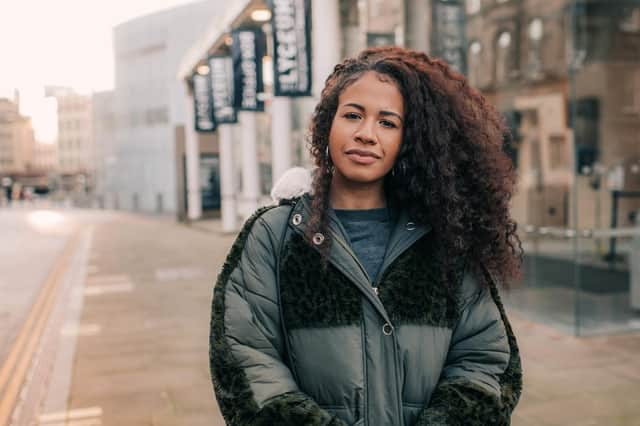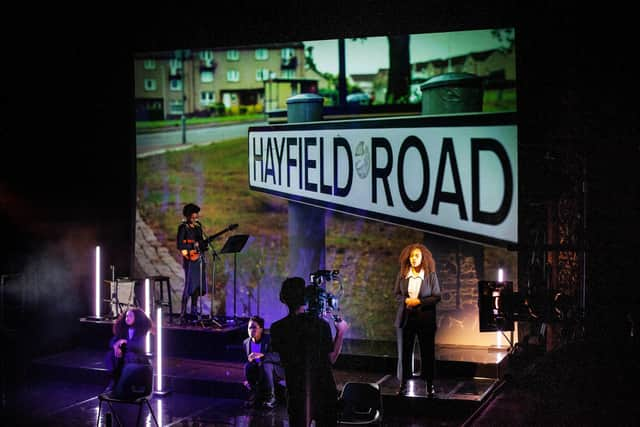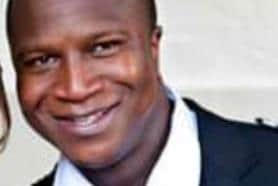Stage star Courtney lifts the curtain on racism in Edinburgh


The play, which receives its world premiere from the stage of the Royal Lyceum, will be available to view online on Friday November 20 and Saturday 21 and tells the story of a young black man who lost his life in Scotland, five years ago; shortly after 7am on the morning of Sunday May 3, 2015, Sheku Bayoh, a 31-year-old gas engineer, husband and father of two died in police custody on the streets of his hometown, Kirkcaldy in Fife.
Lament for Sheku Bayoh, described as a non-apologetic reflection on identity and racism in Scotland today, asks the question: Is Scotland really a safe place? It's a question that can equally be asked of Edinburgh. Cosmopolitan, inclusive and welcoming may be an image the Capital likes to project, but the reality is very different reflects Courtney as she recalls her own experience of growing up in the city during the late-90s and noughties.“This is my first theatrical production, which as a poet is slightly outside my comfort zone, but it was really important for me to be involved in this piece because I grew up in Scotland and am very aware of the racism that is so ever-present here,” says the 26-year-old.
Advertisement
Hide AdAdvertisement
Hide AdTo understand why it was so important, you must first hear of Courtney’s own experiences growing up in the Capital as a person of mixed heritage.


“I stayed all over Edinburgh and am a bit of a nomad in that sense,” she begins. “When I was younger I stayed in Tollcross, in Pilton, Muihouse, Leith, Livingston… and went to several different high schools. One of the reasons I moved schools so much was that I struggled with the racism that I experienced.”
In a city that boasts it welcomes the people of the world with open arms, Courtney’s experience was very different.
“The idea of Scottish exceptionalism is very, very dangerous and certainly in every institution I attended, be it primary school, high school, college or university, I experienced racism that was more often than not brushed under the carpet. I was seen to be the problem. I was seen to be the one who was causing issues when issues were not there.”
Advertisement
Hide AdAdvertisement
Hide AdShe puts that down to the fact that a lot of the racism directed at her was was covert.


“Covert in the sense that people didn’t realise they were being racist,” she explains, adding, “However, a large proportion was also overt, they knew exactly what they were doing. They knew the words and phrases to use to ‘other’ me, things like, ‘Where are you really from?’.
Those words and phrases were something Courtney first heard at primary school.
“When I was younger, it was things like people saying my skin was dirty, or that my hair was ugly, or my features unattractive, all because they didn’t fit into the white idea of beauty.”
Advertisement
Hide AdAdvertisement
Hide AdMore sinister was the covert racism, which played out in the criminalisation of black bodies, she continues, “Although you might do something exactly the same as a white person, you will be seen as a trouble maker for doing so. Or, where it might be cheeky when someone white does it, when you do it, there's a more violent sense placed upon it.”
As an adult, Courtney now understands how society’s reaction to her colour caused much damage to her emotional and mental wellness, as a child, however, she found it upsetting and confusing.
“I always knew I was different because of the way I was treated. I knew I wasn’t reacted to in the same way as everybody else. I'm mixed race, my dad is white and my mum is black. I witnessed my mum experience horrific racism when I was growing up. I always knew it was racism but never understood how it impacted on me. I've attended more middle class schools and some stereo-typically working class schools and it didn't matter which school I went to, I still experienced racism, maybe in slightly different forms, but it was always there. Racism travels between classes.
"It was horrific. My self esteem was so low I struggled to speak to people who were not in my family or comfortable social circle. I couldn't articulate myself and totally shut down and that was directly related to the fact I was seeing how my mum, who is black and much darker skinned than I am, was being treated. I then associated being black negatively because I was surrounded by white people.
Advertisement
Hide AdAdvertisement
Hide Ad"My mum was the only black person in my life apart from an uncle, so I was being indoctrinated with white is right and, as I got older, I began to feel there was something wrong with me and, as a byproduct of that, something was wrong with my mum, eventually I saw blackness as this really negative thing; I could see the way my dad walked through the world as a white man and the way my mum walked through the world as a black woman and I knew which one I wanted. I wanted to have that privilege.”
She adds, “Being mixed race you get to understand the world in a unique way because you are faced with two completely different sides of a story.”
Leaving school at 15 with no qualifications, Courtney moved into her own flat at 16 after which she admits she went off the rails."It wasn't a pleasant time. It was very difficult. What I had experienced growing up had a massive impact on my mental health and I struggled when I left school, I didn't cope well with life at all. I'd always felt I’d experienced the projection of stupidity onto me, which I think a lot of black women do.”
With the support of her mother, family and friends, who she had rejected for a time, the poet turned actress came to understand the life she was living was not the one she wanted.
Advertisement
Hide AdAdvertisement
Hide Ad“It wasn't until I was about 20 and began to educate myself that I came to realise how racism had impacted on me. I became aware that racism isn't just these individual acts of prejudice, it's systematic, it is structural and I hadn't realised just how much I had internalised that in terms of how I thought about myself and perceived how I moved in the world. Now I can look back and see that specific incidents happened because I was being racialised because I'm black.”
Sadly, while there have been some changes in attitudes over the last 20 years, little has really changed, she says, “When I do workshops with young black people they tell me they are still experiencing the exact same things I experienced growing up, so we still have a way to go.
"These young people find themselves in an incredibly difficult situation and my advice is to do as much as possible to unpack that internalised racism and realise that it is something that has been force fed to you by the system. It is not something that is intrinsic to you. Understand these negative beliefs about what it is to be black do not hold any worth and that we give them power by believing them. You must find a way to empower yourself as a young black person because this world won't give it to you.”
To society and those who champion the exceptionalism of Edinburgh and Scotland, she says, “Look a little bit harder and reflect a little bit deeper on the reason you want to believe it's this racial utopia, it makes us so much better if we tackle these issues head on rather than pretend they don't exist.”
Advertisement
Hide AdAdvertisement
Hide AdLament for Sheku Bayoh, Friday November 20, 8pm, Saturday 21 November, 1pm & 8pm, Pay what you can £5-£25, tickets here
A message from the Editor:
Thank you for reading this article. We're more reliant on your support than ever as the shift in consumer habits brought about by coronavirus impacts our advertisers.
If you haven't already, please consider supporting our trusted, fact-checked journalism by taking out a digital subscription
Comment Guidelines
National World encourages reader discussion on our stories. User feedback, insights and back-and-forth exchanges add a rich layer of context to reporting. Please review our Community Guidelines before commenting.